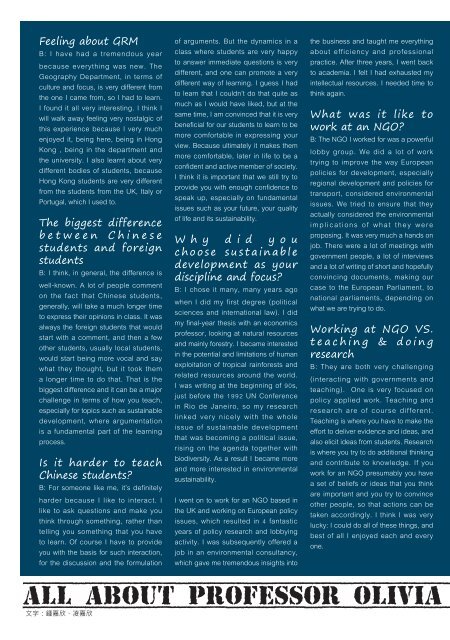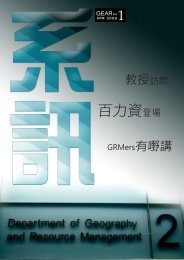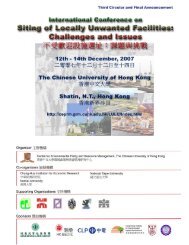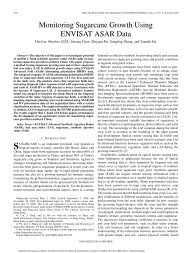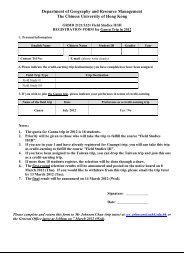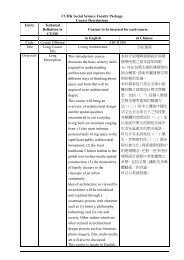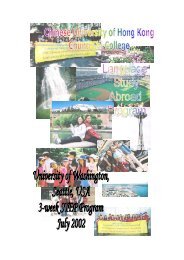第äºæ
第äºæ
第äºæ
- No tags were found...
Create successful ePaper yourself
Turn your PDF publications into a flip-book with our unique Google optimized e-Paper software.
Feeling about GRMB: I have had a tremendous yearbecause everything was new. TheGeography Department, in terms ofculture and focus, is very different fromthe one I came from, so I had to learn.I found it all very interesting. I think Iwill walk away feeling very nostalgic ofthis experience because I very muchenjoyed it, being here, being in HongKong , being in the department andthe university. I also learnt about verydifferent bodies of students, becauseHong Kong students are very differentfrom the students from the UK, Italy orPortugal, which I used to.The biggest differenceb e t w e e n C h i n e s estudents and foreignstudentsB: I think, in general, the difference iswell-known. A lot of people commenton the fact that Chinese students,generally, will take a much longer timeto express their opinions in class. It wasalways the foreign students that wouldstart with a comment, and then a fewother students, usually local students,would start being more vocal and saywhat they thought, but it took thema longer time to do that. That is thebiggest difference and it can be a majorchallenge in terms of how you teach,especially for topics such as sustainabledevelopment, where argumentationis a fundamental part of the learningprocess.Is it harder to teachChinese students?B: For someone like me, it’s definitelyharder because I like to interact. Ilike to ask questions and make youthink through something, rather thantelling you something that you haveto learn. Of course I have to provideyou with the basis for such interaction,for the discussion and the formulationof arguments. But the dynamics in aclass where students are very happyto answer immediate questions is verydifferent, and one can promote a verydifferent way of learning. I guess I hadto learn that I couldn’t do that quite asmuch as I would have liked, but at thesame time, I am convinced that it is verybeneficial for our students to learn to bemore comfortable in expressing yourview. Because ultimately it makes themmore comfortable, later in life to be aconfident and active member of society.I think it is important that we still try toprovide you with enough confidence tospeak up, especially on fundamentalissues such as your future, your qualityof life and its sustainability.W h y d i d y o uc h o o s e s u s t a i n a b l edevelopment as yourdiscipline and focus?B: I chose it many, many years agowhen I did my first degree (politicalsciences and international law). I didmy final-year thesis with an economicsprofessor, looking at natural resourcesand mainly forestry. I became interestedin the potential and limitations of humanexploitation of tropical rainforests andrelated resources around the world.I was writing at the beginning of 90s,just before the 1992 UN Conferencein Rio de Janeiro, so my researchlinked very nicely with the wholeissue of sustainable developmentthat was becoming a political issue,rising on the agenda together withbiodiversity. As a result I became moreand more interested in environmentalsustainability.I went on to work for an NGO based inthe UK and working on European policyissues, which resulted in 4 fantasticyears of policy research and lobbyingactivity. I was subsequently offered ajob in an environmental consultancy,which gave me tremendous insights intothe business and taught me everythingabout efficiency and professionalpractice. After three years, I went backto academia. I felt I had exhausted myintellectual resources. I needed time tothink again.What was it like towork at an NGO?B: The NGO I worked for was a powerfullobby group. We did a lot of worktrying to improve the way Europeanpolicies for development, especiallyregional development and policies fortransport, considered environmentalissues. We tried to ensure that theyactually considered the environmentali m p l i c a t i o n s o f w h a t t h e y w e r eproposing. It was very much a hands onjob. There were a lot of meetings withgovernment people, a lot of interviewsand a lot of writing of short and hopefullyconvincing documents, making ourcase to the European Parliament, tonational parliaments, depending onwhat we are trying to do.Working at NGO VS.t e a c h i n g & d o i n gresearchB: They are both very challenging(interacting with governments andteaching). One is very focused onpolicy applied work. Teaching andresearch are of course different.Teaching is where you have to make theeffort to deliver evidence and ideas, andalso elicit ideas from students. Researchis where you try to do additional thinkingand contribute to knowledge. If youwork for an NGO presumably you havea set of beliefs or ideas that you thinkare important and you try to convinceother people, so that actions can betaken accordingly. I think I was verylucky: I could do all of these things, andbest of all I enjoyed each and everyone.F u n n y o r s p e c i a lexperience in GRMB: By the time I leave GRM, I’llhave spent 12 months at CUHK.As I said, it has been a tremendousexperience. The department is unique,in my experience, for the positive andconstructive atmosphere amongstcolleagues, staff and students. This isinvaluable, it makes everything easier.On a more social front, GRM organizesmany social activities, which were anovelty for me. I was more used to:you work, and then you go home, andthat’s it. So I think GRM certainly hasintroduced me to a different philosophyof work. It organizes a lot of activitieswith the students, with professors, andwith the both groups, which have beenvery nice. And the food? Did I mentionthe food? Oh how I will miss that.Why are you leaving sosoon? What are yourplans afterwards?B: The reason why I am leaving isessentially a personal reason linked tomy husband’s own job, which remainsbased in Europe. Fortunately, I had sixmonths to prepare and I’ve been givena job at the University of Lisbon, backin Portugal. I will be joining the Instituteof Social Sciences there. I will be doingmore research, with some teaching atgraduate level, probably on sustainabledevelopment, climate change andenergy. I am planning to focus myresearch on conceptions of progress,growth and sustainability, with particularfocus on happiness, wellbeing andthe role of energy in shaping andenabling these goals. There will bea lot of overlap with the topics that Ihave been teaching at GRM but takinga silently different angle. I also planto continue working on China, andon environmental governance andassessment methods, which continuesto be a key area of work for me.D o y o u l i k e H o n gKong?I loved being in Hong Kong, and willregret leaving it very much.I think Hong Kong is a very beautifulplace, in terms of geography it hasa fantastic location, a very beautifullandscape; I just love looking out andseeing these amazing green mountains.They fill you with joy. I think you arevery lucky to live here.I spent quite some time in Beijing.The first time I came back to HongKong to visit my brother from mainlandChina, I remembered I was shockedby the amount of GREEN there is inHong Kong. Beijing is so grey and dryin winter. That was a very interestingreaction, since usually one thinks ofHong Kong as a row of skyscrapers.Applying for this job was a bit of areunion with Hong Kong, which I haveknown since the late 1980s. I think itis a very special place. Indeed, I thinkyou should be more aware ofh o w l u c k yyou are, andenjoy it.07Message to GRMers:I would like to say to students: SPEAKUP, express your views and hopes forthe future, and WORK HARD.A n d D O N ’ T C O M P L A I N A B O U TWORKLOAD. You don’t have such veryheavy workload when compared toother top universities around the world.If you ask your student colleagues whogo to foreign universities after being inCUHK, invariably, they will tell you thatthe workload they face is even higher.Don’t complain, work hard: becausethis is your best chance to learn, toenjoy learning; work life is a completelydifferent ball game.And DON’T’ WORRY ABOUT MAKINGMISTAKES. That is a big culturaldifference I have learnt. It’s ok to makemistakes. We learn from our mistakes.Indeed, we learn a lot from mistakes.You should be much, much more freeto try things out. You should feel freeto express yourself, even if you endup giving the wrong answer. It doesn’tmatter, you are here to learn. Enjoy it!All about Professor Olivia Claudia Bina文 字 : 鍾 嘉 欣 、 凌 嘉 欣


